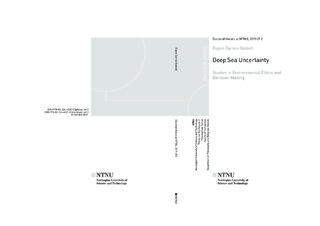Deep Sea Uncertainty. Studies in Environmental Ethics and Decision-Making
Doctoral thesis
Permanent lenke
http://hdl.handle.net/11250/2643714Utgivelsesdato
2019Metadata
Vis full innførselSamlinger
Sammendrag
English summary
Should we mine the ocean floor? Deep sea mining involves retrieving minerals – such as copper, zinc, and rare earth elements – from the ocean floor at great depths. This form of mining is still in its infancy, with high expectations for societal benefits and economic gain. At the same time, there are significant uncertainties regarding environmental impact and how to mitigate potential harm.
The thesis contains three philosophical studies of relevance to the question of whether we should mine on the ocean floor. The first study concerns the role that “existence value” should play in evaluating activities involving a risk of species extinction, such as deep sea mining. Existence value refers to the value we may ascribe to the existence of something, for instance a certain species or ecosystem, regardless of whether it is or will be of any particular use to us. In the study, it is argued that existence value based on preference satisfaction has ethical significance and should be taken into consideration in evaluating activities that come with a risk of species extinction.
The second study concerns decision-making among options, for instance whether we should allow or not that a certain deep sea mining project proceeds, when it is not clear how to compare the options. It is argued that the idea of choices expressing a moral identity – reflected in statements about what kind of people or society we ideally think we should be – may lead us in the direction of a plausible solution to these challenging cases.
Several authors argue for a precautionary approach to deep sea mining. Precautionary measures may involve substantial burdens for actors and affected parties, for instance in the form of economic costs. In the third and final study of the thesis, a framework is proposed for the fair distribution of costs of taking precautionary measures against environmental risk. Norsk sammendrag
Bør vi drive med gruvedrift på havbunnen? Gruvedrift på havbunnen innebærer å fremstille og hente opp mineraler – som kobber, sink og sjeldne jordarter – fra havbunnen på store dybder. Denne formen for gruvedrift er fortsatt på utviklingsstadiet, med høye forventninger om nytte for samfunnet og økonomisk gevinst. Samtidig er det stor usikkerhet knyttet til miljøkonsekvenser og hvordan skade kan unngås eller reduseres.
Avhandlingen består av tre filosofiske studier med relevans for spørsmålet om hvorvidt vi bør drive med denne formen for gruvedrift eller ikke. Den første studien omhandler hvilken rolle «eksistensverdi» bør spille i vurderingen av aktiviteter som innebærer en risiko for tap av artsmangfold, slik gruvedrift på havbunnen kan gjøre. Eksistensverdi er verdien vi tilskriver noes eksistens, for eksempel eksistensen til en art eller et økosystem, uavhengig av nytteverdien den eventuelt måtte ha. I studien argumenteres det for at eksistensverdi har etisk betydning og bør tas i betrakting i vurderinger av aktiviteter som innebærer en risiko for artsutryddelse.
Den andre studien dreier seg om valg mellom alternativer – eksempelvis mellom å tillate eller ikke tillate et bestemt gruvedriftsprosjekt – når det er uklart hvilket alternativ som er best med hensyn til relevante kriterier (som miljøskade og samfunnsnytte). Her argumenteres det for at ideen om at valg uttrykker en bestemt «moralsk identitet» – reflektert i utsagn om hva slags mennesker eller samfunn vi mener vi bør være – kan peke oss i retning av en adekvat beslutningsprosedyre for disse vanskelige tilfellene.
Flere har tatt til orde for en føre var-tilnærming til gruvedrift på havbunnen. Dette kan innebære substansielle byrder for berørte parter, for eksempel i form av økonomiske kostnader. I den tredje og siste studien foreslås et rammeverk for hvordan kostnader knyttet til risikoreduserende tiltak kan fordeles på en moralsk forsvarlig og rimelig måte.
